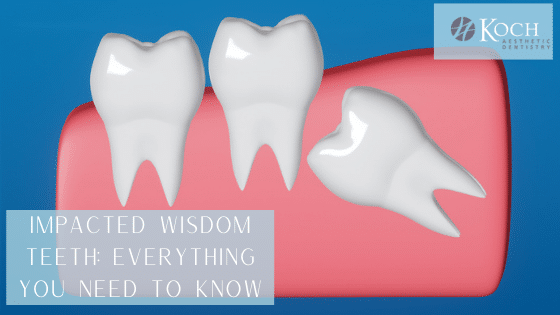
10 Feb Impacted Wisdom Teeth: Everything You Need to Know
Dentists use the term wisdom teeth to describe third molars that reside in the back of your mouth. Wisdom teeth are the last adult teeth to come in and usually erupt in the late teenage years or early adulthood.
When these molars don’t have enough room to emerge and develop normally, they can become impacted and may stay under the gumline. Impacted wisdom teeth can cause pain, headaches, teeth crowding, and more. This article breaks down the signs, symptoms, and treatment options for impacted wisdom teeth.
Signs of Impacted Wisdom Teeth
Some people may have no signs or symptoms of impacted wisdom teeth, while others can develop pain and infections. When the third molars break through the gum surface but don’t completely develop, they can allow food particles and bacteria to get trapped in the area and cause swelling and infection. This type of impacted wisdom tooth is called partially impacted and can cause symptoms like:
- Bad breath
- Bad taste in your mouth
- Swelling and bleeding in the gums
- Pain and swelling
When the third molar stays completely below the gum line, it is referred to as a fully impacted wisdom tooth. Fully impacted wisdom teeth can cause tooth crowding and shifting, headaches, sinus pain, congestion, and more.
How Do I Know If I Have an Impacted Wisdom Tooth?
Your dentist will be able to tell if you have impacted wisdom teeth by talking to you about your symptoms and taking an X-ray of your mouth. An X-ray can provide a more precise idea of the state of your third molars or impacted wisdom teeth, as well as the overall condition of your teeth and jawbones. If your dentist discovers that you do indeed have impacted wisdom teeth, you can have a conversation about the best strategy for dealing with them.
What is the Treatment for Impacted Wisdom Teeth?
If your impacted wisdom teeth are causing you pain or presenting other issues for your dental health, your dentist may recommend surgery to extract them. The surgery is usually performed as an outpatient procedure, and you will most likely be allowed to go home the same day.
Before the surgery, your dentist will use anesthesia to make you more comfortable during the surgery and ensure you don’t experience any pain or discomfort. The three different types of anesthesia used for wisdom teeth extraction are:
- Local anesthesia: numbs your mouth
- Sedation anesthesia: helps to relax you and prevent pain
- General anesthesia: makes you fully fall asleep and not feel anything during the procedure
During the surgery, your dentist will make an incision in your gum and remove the impacted wisdom tooth. Your dentist will then use stitches to close the wound and send you home with medication and an explanation of proper wound cleaning and care.
Complications from Impacted Wisdom Teeth
If left untreated, impacted wisdom teeth can continue to present problems for your oral health. Some complications that could arise from impacted wisdom teeth are:
- Damage to other teeth
- Infection
- Cysts
- Decay
- Gum disease
- Difficulty flossing
- Cavities
- Crowding of other teeth
If you are not sure about the state of your wisdom teeth or would like to get treatment for impacted wisdom teeth, Dr. Koch and our helpful staff are here to address your needs!
Koch Aesthetic Dentistry in Birmingham, Alabama
Impacted wisdom teeth can cause pain and other dental complications. Dentists recommend removing impacted wisdom teeth as soon as possible. If you’d like to learn more about signs, symptoms, and treatment options for impacted wisdom teeth, contact us today and schedule an appointment with Dr. Koch.


